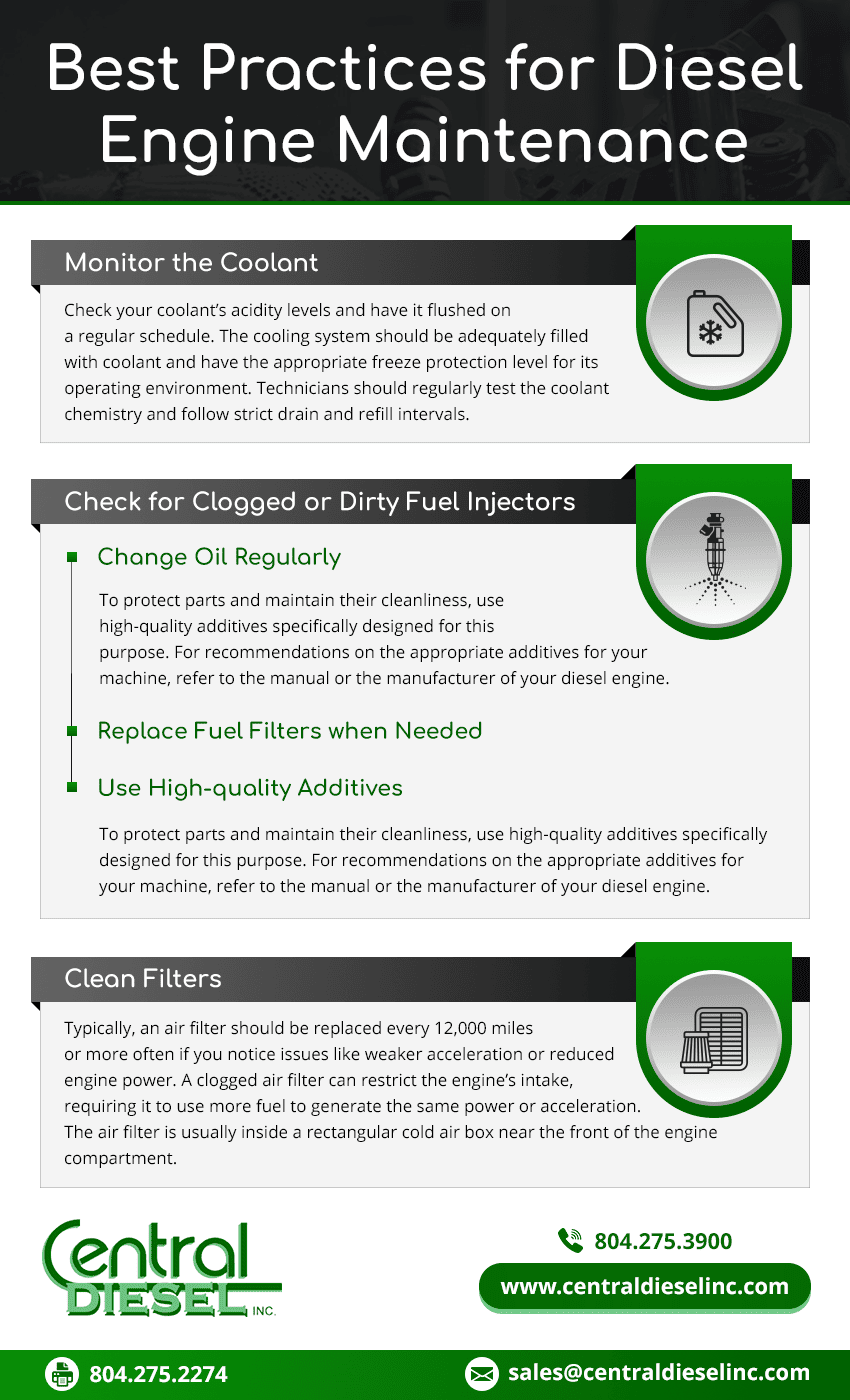Diesel engines are widely used in automobiles, generators, marine vessels, industrial machinery, and more. They are known for their durability, efficiency, and power. However, like any other type of engine, diesel engines require regular maintenance to ensure optimal performance and longevity. Implement these best practices for diesel fuel system maintenance to prevent breakdowns, reduce repair costs, and extend the engine’s life.
Monitor the Coolant
Regularly monitoring your diesel engine’s coolant is critical for optimal engine performance. Over time, the coolant becomes more acidic and can corrode other cooling system parts, such as the radiator. Check the coolant’s acidity levels and have it flushed on a regular schedule.
Moreover, make sure the cooling system is adequately filled with coolant and has the appropriate freeze protection level for its operating environment. Failure to do so can cause overheating and corrosion or result in the coolant freezing and expanding, causing passages or lines to crack.
Low coolant levels likely indicate loose or worn hoses or leaking radiator. Sometimes it may be caused by head gasket leakage, which can eventually contaminate the engine oil and cause engine failure. Tier IVF and IVi engines should be checked for nitrogen reduction system (NRS) and exhaust gas recirculation (EGR) cooler leaks. These leaks present as a slow, constant loss of coolant, and if left unchecked, they can damage the diesel particulate filter, intake, and intake valves.
To maintain proper coolant levels and properties, technicians should regularly test the coolant chemistry and follow strict drain and refill intervals. Your coolant supplier can also be a valuable resource for verifying the effectiveness of your chosen preventive maintenance procedures.
Check for Clogged or Dirty Fuel Injectors
Maintaining clean fuel injectors and diesel fuel is crucial to keeping diesel engines running smoothly. Diesel fuel is more viscous than gasoline and can more easily hold dirt and debris in suspension. When injectors are clogged or dirty, the fuel may not spray properly in a fine mist, causing the engine to skip or completely stop.
Here are some signs that your diesel injection systems are dirty or clogged:
- Black smoke from the exhaust manifold
- Hard starting
- Rough idling
- Pinging sounds
- Throttle hesitation
- Increased fuel consumption
- Poor engine performance
To keep diesel fuel injection systems clean, it’s essential to:
- Change oil regularly: Oil picks up contaminants from the engine, leading to buildup on the fuel injectors. Regular oil changes remove this buildup and ensure the engine runs smoothly and efficiently.
- Replace Fuel Filters when needed.
- Use high-quality additives: To protect parts and maintain their cleanliness, use high-quality additives specifically designed for this purpose. For recommendations on the appropriate additives for your machine, refer to the manual or the manufacturer of your diesel engine.
If the engine exhibits irregular running, rapping, or black smoke, the spray nozzle valves may be clogged or held open due to dirt particles. This can cause inefficient fuel combustion, leading to poor performance and black smoke.
Clean Filters
Diesel engines commonly have two fuel filters: A primary filter between the fuel tank and engine and a secondary filter between the fuel injectors and transfer pump. Diesel fuel, being less refined, absorbs the extra water from condensation in the tank. Water in the fuel can cause several problems, including reduced fuel efficiency and engine stalling. This is why manufacturers build diesel engines with two fuel filters and sometimes three.
Regularly changing air filters also ensures your engine runs smoothly. The air filter is usually inside a rectangular cold air box near the front of the engine compartment. A clogged air filter can restrict the engine’s intake, requiring it to use more fuel to generate the same power or acceleration. Typically, an air filter should be replaced every 12,000 miles or more often if you notice issues like weaker acceleration or reduced engine power.
Schedule Your Diesel Engine Maintenance Today with Central Diesel
Following best practices for diesel engine maintenance can save you time and money by preventing unwanted downtime. It also ensures that your diesel engine runs efficiently, reducing fuel consumption.
At Central Diesel, we specialize in diesel engine maintenance and repairs. Our technicians provide comprehensive diesel fuel maintenance services tailored to your specific needs. We use the latest diagnostic tools and equipment to identify potential issues before they become major problems. Request a quote or contact us today to learn more about our diesel engine maintenance services.





